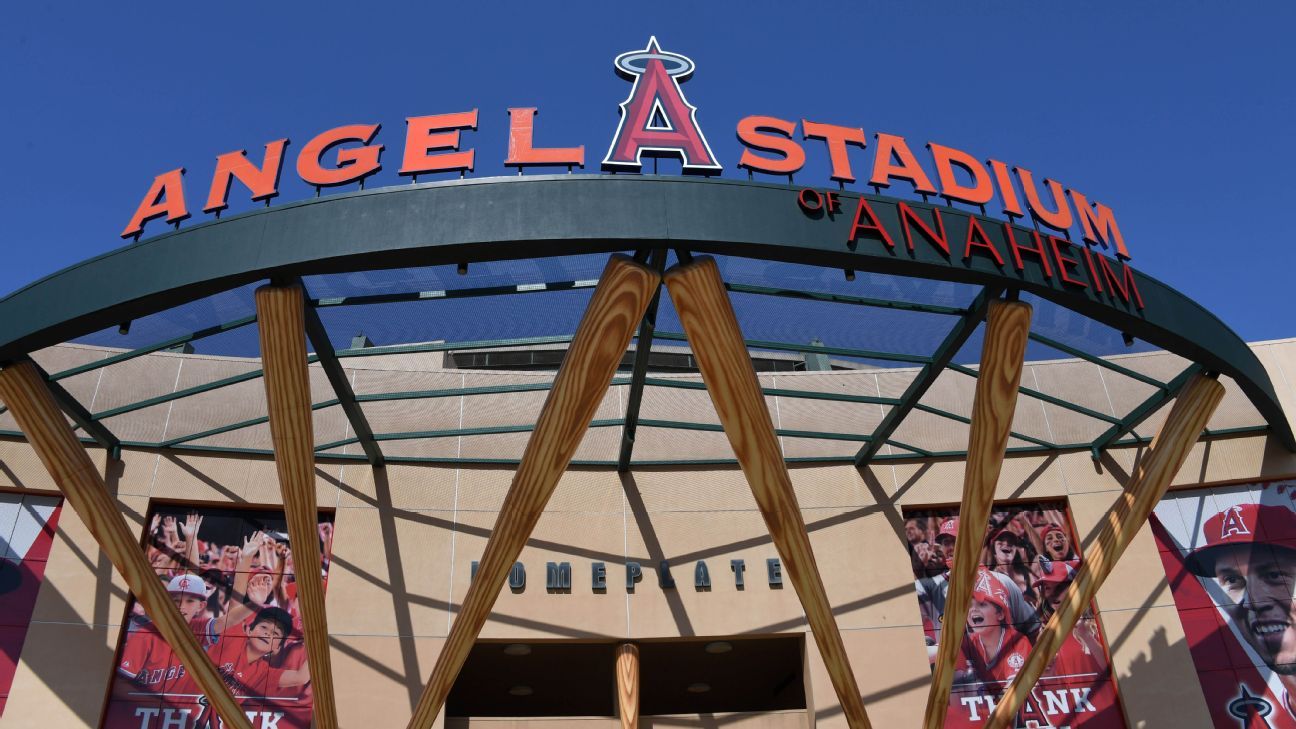Angels Clubhouse Phone Ban: What Happens Next?
Is a simple rule change enough to foster a new era of focus and discipline in the high-stakes world of professional baseball? The Los Angeles Angels are betting on it, implementing a strict ban on cell phone usage within their clubhouse this spring training, a move that could redefine team culture.
The air of anticipation hung heavy as spring training commenced, not just for the usual reasons of fresh starts and roster battles, but also due to a significant policy shift orchestrated by Angels manager Ron Washington. The decree was simple: no cell phones in the clubhouse. The rationale, however, was anything but. Washington, a seasoned veteran of the game, recognized the pervasive distraction that smartphones pose in the modern era. His aim was to cultivate an environment where players could fully immerse themselves in their craft, fostering deeper connections, and minimizing the outside world's interruptions.
The move, initiated at the start of spring training, wasn't just a suggestion; it was a firm directive backed by a clear consequence. Players found in violation of the rule would be hit with a $500 fine. However, Washington was quick to clarify his intentions. Its not punishment, he asserted, painting a picture of the rule as a tool for self-improvement, a means of regaining lost focus. The emphasis was not on the penalty but on the opportunity: an invitation to reclaim valuable time, free from the incessant pull of notifications and social media.
Washington, known for his directness and his ability to connect with players, further emphasized the importance of accountability. He placed the responsibility of enforcing the new rule squarely on the shoulders of the players themselves. Veteran leaders within the Angels organization, including the esteemed Mike Trout and Kyle Hendricks, were designated as the rule's guardians, tasked with ensuring compliance. This strategy not only fostered a sense of ownership amongst the players but also underscored the team's commitment to the collective good. The expectation was that if a teammate, or even the manager himself, were to slip up, they would be held accountable, reinforcing the shared values of the group.
Of course, the directive wasn't meant to be an ironclad restriction. Recognizing the vital role of communication, especially in emergencies, exceptions were made. Players were still able to use their phones in urgent situations, a sensible caveat that balanced the need for focus with the realities of life. The ultimate aim was to create a space where players could concentrate on their training, develop stronger camaraderie, and maximize their preparation for the upcoming season.
The echoes of similar initiatives are heard across the sporting landscape. In various environments, from the locker rooms of other professional teams to the high-pressure confines of corporate boardrooms, the benefits of limiting digital distractions are becoming increasingly apparent. The constant influx of information, the urge to check social media, and the ever-present temptation to engage in digital interactions can be detrimental to productivity, focus, and mental well-being. By removing these distractions, Washington hoped to create an environment where players could not only hone their skills but also cultivate a stronger sense of presence and engagement.
While the specifics of the rule are centered on cell phones, the broader implications touch on themes of personal responsibility, team culture, and the balance between the digital and the physical worlds. Washingtons initiative prompted questions about the role of technology in modern sports, the impact of distractions on performance, and the importance of establishing clear boundaries to safeguard the mental and emotional space of athletes.
Beyond the immediate impact on the Angels clubhouse, Washingtons approach has sparked wider conversations. The $500 fine, which Washington suggested, is a tangible reminder of the cost of distraction. Its a cost that goes beyond mere financial implications. It includes the lost opportunity to improve, to bond with teammates, and to fully immerse oneself in the experience of the game. Such is the spirit of the initiative.
The Angels themselves, however, are not alone in confronting the regulatory complexities of their profession. Across the sports world, organizations grapple with the financial ramifications of rule violations. The potential for sanctions and fines is ever-present, whether stemming from on-field incidents, off-field misconduct, or breaches of league-specific regulations.
The specter of potential fines looms large. The penalties assessed, the levels of enforcement, the nature of the breach, the player's standing within the organization, and the broader ramifications of their actions all determine what happens next. The potential financial burdens are considerable and can have a range of consequences, extending from public image to performance on the field.
The implications extend far beyond the clubhouse walls. In other high-stakes arenas, penalties are not uncommon. The Information Commissioner's Office (ICO) is a notable example in the UK. This independent body has the power to fine organizations that breach data protection rules. The severity of the fine depends on the nature of the infraction. It emphasizes the importance of adhering to privacy regulations, with the fines levied intended to serve as both punishment and a deterrent.
Similarly, the healthcare industry grapples with stringent regulations designed to protect patient privacy. Violations of the Health Insurance Portability and Accountability Act (HIPAA) can lead to significant civil penalties. The Office for Civil Rights (OCR) within the Department of Health and Human Services (HHS) is responsible for imposing monetary fines. The amount varies based on the level of negligence, with penalties potentially reaching millions of dollars. This illustrates the critical importance of protecting sensitive patient data, with the fines serving as a deterrent against breaches.
The world of digital privacy offers additional insights into the enforcement of rules. The General Data Protection Regulation (GDPR) is a comprehensive set of data protection rules. Violations of the GDPR can lead to substantial penalties for non-compliance. The ICO, as previously mentioned, is the body responsible for imposing fines within the UK. The overarching goal is to protect the privacy of individuals and to ensure that organizations take data protection seriously.
The Massachusetts Gaming Commission also demonstrates the importance of vigilant oversight. It actively works to protect consumers, swiftly addressing and resolving any issues that arise. This proactive approach is a key aspect of responsible regulation in the gambling industry. It helps maintain the publics trust and ensures that the industry operates fairly and transparently.
These diverse examples demonstrate the significance of clear rules, firm enforcement, and the consequences of non-compliance. The Angels' cell phone ban, the potential sanctions for rule breaches, and the broader application of regulations across industries all serve as a reminder of the importance of adhering to established guidelines. The goal is to maintain order, foster trust, and protect the well-being of those affected.
Back in the Angels' clubhouse, the effectiveness of Ron Washington's cell phone ban is yet to be fully realized. However, the initial reaction has been positive. The players, understanding the underlying purpose of the rule, have begun to embrace the change. The focus is on creating an environment conducive to success. Mike Trout and Kyle Hendricks, as leaders, have taken their roles seriously, setting the tone for a new era of dedication.
The true test of Washingtons initiative, however, lies in the season ahead. Will the reduced distractions translate into improved performance? Will the players develop a deeper connection to the game and to one another? Only time will tell. But for now, the Los Angeles Angels are setting an example of how a simple policy shift can pave the way for a renewed focus, a stronger team culture, and a fresh start for the upcoming season.
The Angels' story is not merely about a cell phone ban. It's about the ongoing evolution of sports, the constant search for competitive advantages, and the enduring human desire to improve and connect. It's a testament to the power of leadership and the unwavering pursuit of excellence.
| Full Name: | Ronald "Ron" Washington |
| Born: | May 10, 1952 (age 72) |
| Birthplace: | New Orleans, Louisiana, USA |
| Playing Position: | Infielder (MLB) |
| Managerial Career: | MLB |
| Teams Managed: | Texas Rangers (2007-2014), Oakland Athletics (Interim manager, 1996), Los Angeles Angels (2023-Present) |
| Notable Achievements: | American League Pennant (2010, 2011), NL Manager of the Year (2022 - while coaching for the Atlanta Braves) |
| Playing Career Highlights: | MLB infielder for the Los Angeles Dodgers, California Angels, Cleveland Indians, Baltimore Orioles, and New York Mets |
| Coaching Career Highlights: | Third base coach for the Oakland Athletics (1996-2006), Manager for the Texas Rangers (2007-2014), Third base coach for the Atlanta Braves (2017-2022) |
| Playing Experience: | Played professionally from 1977 to 1990. |
| Known For: | His emphasis on fundamentals, player development, and building a positive team culture. |
| Link to Reference: | MLB.com |
Beyond the Angels, other teams and organizations are assessing their approaches to technology and focus, recognizing the need for similar strategies. The challenge is not only to limit distractions, but also to foster a culture that values presence, collaboration, and the pursuit of peak performance. The ongoing debate highlights the dynamic interplay between technology, human behavior, and the quest for success.


